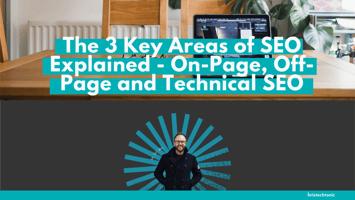The practice of improving a website's visibility and ranking in search engine results pages is...
A Comprehensive Guide to Outbound Links for SEO
Search Engine Optimisation (SEO) ensures people can find your website online. Doing it properly ensures you rank highly on search engine result pages when users search queries that include the keyword(s) you have optimised your website for. You must understand a few fundamental principles to do SEO correctly, one of the most important being link building.
What is a Link?
A link is a text snippet that, when clicked on, takes a user to another webpage. The webpage might be on the same website or a different one. The first category of links is internal links, and the second is external links. Understanding these types of links and how and when to use them is one of the first things anyone should understand as they learn about SEO as a beginner.
Understanding External Links
Two main types of links point from one domain to another. The first is backlinks or inbound links, and the second is outbound. Inbound links are links placed on other websites that point to your website, while outbound links are links on your website that point to other domains or websites.
In SEO, most discussions surround inbound or backlinks. The reason is that they are a crucial ranking factor, with Google confirming that having a high number of high-quality backlinks leads to higher rankings if you have followed other principles of SEO.
In this article, we will look at everything you need to know about outbound links, how to use them properly, and how they impact SEO.
Types of Outbound Links
With outbound links, you have do-follow and no-follow links. Understanding their differences will help you better understand which to use and when.
Do-follow Links
These are outbound links that PageRank to the websites to which they point. They point search engine crawlers or spiders to other web pages so these spiders or crawlers can find them, and their respective search engines can index and rank these websites.
Making your website a “bridge” between these crawlers and the linked website is what makes SEOs decide that these links pass PageRank to the linked pages.
Do-follow links are the default type of link created when you create a link, so no extra coding is required.
Some examples of places you would use do-follow links include:
- Guest posts
- Testimonial links
- Resource and review links
- Editorial links
- Acknowledgement links
- Press release links
- Directories and syndication platforms
No-follow Links
A no-follow link is the direct opposite of a do-follow link as it does not pass PageRank to the website linked to. In the past, these outbound links had no SEO benefits to the linking website or the website being linked to. However, Google changed the way it sees them in March 2021.
Google said it had changed its algorithm to take no-follow links as a hint for crawling and indexing and not a directive like it does for do-follow links. In this way, some no-follow links can pass PageRank if Google’s algorithm deems them useful for ranking and indexing.
There are different types of no-follow links, including:
- UGC links - These have a rel=“UGC” attribute and these links are for user-generated content such as fulcrum posts and comments.
- Nofollow links - These do not have extra attributes and are helpful if you do not want Google to associate your website with another.
- Paid links - These include the rel= “sponsored” attribute and are to be used for links to do with paid placements and advertisements.
- Multiple rel links - These links have multiple rel attributes that are comma- or space-separated.
When to Use Dofollow Vs. Nofollow Links
You should only use do-follow links if the website or domain you are linking to is trustworthy and credible and when you want to pass your PageRank to it. You should use no-follow links for sponsored, paid-for, untrusted and user-generated content or web pages.
If you are unsure about the type of link to create, create a no-follow one. By doing so, Google will not penalise you if the site is untrustworthy or should have been marked as no-follow based on its guidelines.
Why Outbound Links Matter
Outbound links let readers leave your website to pursue information or content on other websites that you deem essential for them to read or consume. You can link to external websites for several reasons, including to let users find additional information, back up assertions and statistics, allow users to verify facts, and find other important resources.
Outbound links are also very important for various forms of marketing, such as social media or affiliate marketing. In the first case, they link to your social media platforms, allowing for discoverability and visibility.
In the second case, they lead users to pages where they can purchase products or services from businesses and brands they have partnered with. In such use cases, they become an important part of your monetisation strategy.
Apart from linking to your other resources, such as your social media platforms and affiliate pages, it might seem counter-intuitive to lead users away from your website using outbound links.
The one thing many people fail to realise is that outbound links have a significant effect on your SEO. In short, failure to include them can have a significant negative impact on your SEO.
How Outbound Links Impact SEO
Outbound links are crucial for increasing the relevance of your website and content. Outbound links are like a trail that allows search engine crawlers to process your content, find out what niche or industry you are in, and find additional context about your website and its content.
These links are also useful for helping search engines understand what problems you are trying to solve, what information you are trying to provide, your competitors, and similar content.
Once Google understands all this, it knows which keywords, topics, and queries to rank your website and content for, even if it will do that amongst content your competition already ranks for.
The Benefits of Using the Right Outbound Links
When used properly, outbound links have several benefits.
Increasing Online Authority
It is often thought that backlinks are the best way to increase authority, and that is true. However, outbound links are a great way of doing so, too. Google tends to group websites depending on whom they associate with, metaphorically speaking. If a website contains authoritative outbound links, Google tends to give it a higher authority rating, putting it in a better SEO position.
Enhances Online Reputation
People love businesses that lead them to the resources they need when they need them.
Most people do not have a lot of time to find high-quality and highly relevant websites and content, especially when doing research. If you can lead them down the right path, that will increase your reputation, and they will see you as an expert.
This also ties into providing your users with a better user experience. A better user experience will lead to users remembering your website and visiting it in the past.
There is also an increased likelihood of converting on a second or third visit because they now trust you as an authoritative source that gives them exactly what they are looking for.
Increasing Opportunities for Backlinks
Savvy marketers and SEOs always look at their traffic sources to optimise their strategies. If you link to enough websites, you can be sure that their marketers and SEOs will notice. When they do, they might visit your website, see that it could be valuable to them and their readers, and give you a backlink.
This type of natural link building is much more beneficial. For one thing, you know the other website wants to do this as you did not solicit the backlink. Secondly, you are more likely to get high-quality visitors because you both have something in common.
Choosing High-quality Outbound Links
Now that you understand what outbound links are and why they are important, how do you choose the links to add to your website? There are several factors to consider, arguably the most important being relevance.
These are websites that have similar content and audiences to yours. For example, if you are a tech website, it does not benefit you much to link to a beauty website. Additionally, the beauty website is much less likely to give your tech website a backlink in this example.
The second thing to consider is semantic relevance. The links you include should have relevance to your content. There should be a close correlation between the surrounding text within which the outbound link exists and the place that it points to.
Lastly, you should avoid pages that have:
- Low-quality content
- Off-page spam
- On-page spam
Remember that Google groups websites together, and you do not want to find yours within a group of websites that Google deems undesirable or not good candidates for ranking.
While most SEOs and marketers focus on backlinks or inbound links, they can derive a lot of value from outbound links. There are links pointing to other websites relevant to the content within which the link exists and the audience that reads the content. Because of this, outbound links should become an integral part of your link-building strategy.




